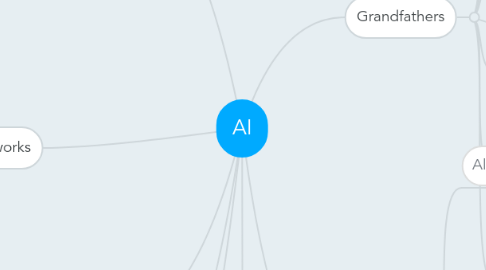
1. Logic (GOFAI)
1.1. Allen Newell
1.1.1. Logic Theory Machine (1956)
1.1.2. General Problem Solver (1957)
1.2. Herbert A. Simon
1.2.1. Elements of a theory of human problem solving
1.2.2. Human Problem Solving
1.3. Alain Colmerauer
1.3.1. Prolog (1972)
2. Neural Networks
2.1. Frank Rosenblatt
2.1.1. Perceptron (1958)
2.2. Paul Werbos
2.2.1. Backpropagation (1974)
2.3. Deep Learning
2.3.1. Kunihiko Fukushima
2.3.1.1. Neocognitron (1980)
2.3.2. Yann LeCun
2.3.3. Ruslan Salakhutdinov
2.3.4. Geoffrey Hinton
2.3.5. Yoshua Bengio
2.3.6. Google Brain
2.3.6.1. Andrew Ng
2.3.6.2. Jeff Dean
3. Bayesians
3.1. Ray Solomonoff
3.1.1. Algorithmic Probability (1960s)
3.1.2. Kolmogorov Complexity
3.2. Judea Pearl
3.2.1. Bayesian Networks
3.3. Paul Smolensky
3.3.1. Restricted Boltzmann machine (1986)
3.4. Markov random field (Markov network)
4. Evolutionary Computation
4.1. Genetic programming
4.2. Evolutionary programming
4.3. Neuroevolution
4.4. Reinforcement learning
4.5. Swarm algorithms
5. Implementations
5.1. Arthur Samuel
5.1.1. First game-playing program (checkers) (1952)
5.2. J.C. Shaw
5.2.1. Logic Theorist
5.2.2. IPL
5.3. Joseph Weizenbaum
5.3.1. ELIZA (1965)
5.4. Joel Moses
5.4.1. Macsyma (1968)
5.5. Hans Moravec
5.5.1. The Stanford Cart (1979)
5.6. Ernst Dickmanns
5.6.1. first robot car (1980)
5.7. Deep Blue (1997)
5.8. Kismet (2000)
5.9. Honda ASIMO (2005)
5.10. Google self driving car (2009)
5.11. Watson (2013)
6. Grandfathers
6.1. Alonzo Church
6.1.1. Lambda Calculus (1920s)
6.2. Bertrand Russell
6.2.1. Principia Mathematica (1913)
6.3. John von Neumann
6.3.1. Digital Computer
6.3.2. Cellular Automata
6.3.3. Game Theory
6.4. Konrad Zuse
6.4.1. first program-controlled computers (1941)
6.5. Kurt Gödel
6.5.1. The Incompleteness Theorem (1931)
6.6. Leonardo Torres y Quevedo
6.6.1. Chess Automaton (1915)
6.7. Cybernetics
6.7.1. Arturo Rosenblueth
6.7.1.1. Behavior, Purpose and Teleology
6.7.1.2. Mind and Brain: A Philosophy of Science
6.7.2. Norbert Wiener
6.7.2.1. Cybernetics: Or Control and Communication in the Animal and the Machine
6.7.3. Julian Bigelow
6.8. Foundation of NNs
6.8.1. Walter Pitts
6.8.2. Warren Sturgis McCulloch
7. Founders
7.1. Alan Turing
7.1.1. Computing Machinery and Intelligence (1950)
7.2. Dartmouth Conference
7.2.1. John McCarthy
7.2.1.1. LISP
7.2.1.2. Recursive functions of symbolic expressions and their computation by machine (1960)
7.2.1.3. Generality in artificial intelligence
7.2.1.4. Epistemological problems of artificial intelligence (1977)
7.2.2. Nathan Rochester
7.2.3. Marvin Minsky
7.2.3.1. Society of Mind: A Response to Four Reviews (1991)
7.2.3.2. Perceptrons - an introduction to computational geometry
7.2.3.3. Symposium on Artificial Intelligence (1962)
7.2.3.4. Frame problem (1975)
7.2.4. Claude Shannon
7.2.4.1. Programming a Computer for Playing Chess (1950)
8. Skeptics
8.1. John Lucas
8.1.1. Minds, Machines and Gödel (1961)
8.2. James Lighthill
8.2.1. Lighthill report (1973)

